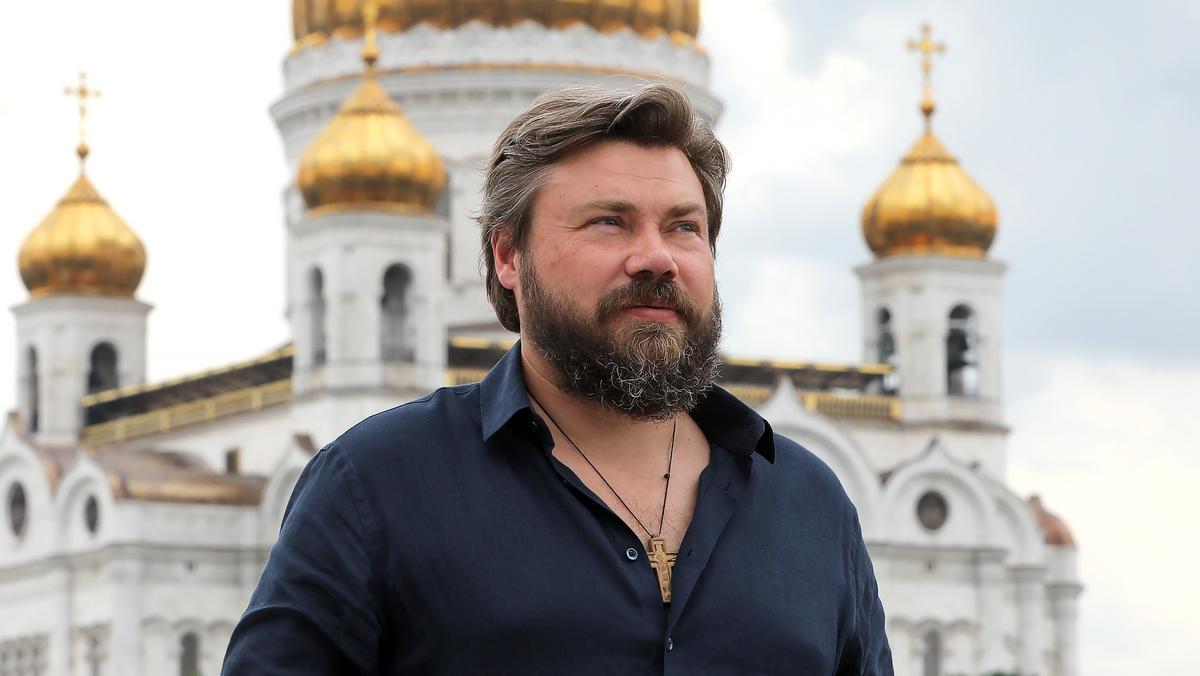Have a look at this array of headlines:
The predictions are coming true: Ukraine is no more
Inhuman army: even the special operation is powerless against this enemy
The ‘elites’ fleeing Russia form a homeless diaspora
We’ve found out who is funding the war against Russia. And it’s not America
All systems go. The start of the US self-liquidation
Worse than a nuclear war: the ‘Golden Billion’ is ready for global elimination
Someone who is not familiar with the situation may think that these headlines are from clickbait online ads. You know, something in line of “Doctors HATE HIM for discovering this simple trick. Learn the truth NOW!” Actually, these are the most read articles on the well-respected Orthodox conservative website Tsargrad, one of the most loyal propaganda mouthpieces supporting Russia’s war in Ukraine, which is now entering its sixth month. Long before 24 February, Tsargrad positioned itself as a media outlet that would “rebuild the empire”: essentially, it transmitted the narrative of the so-called “party of war” long before it officially established itself.
But here’s the thing: despite the war frenzy of the Russian public and especially the government, Tsargrad does not seem like the flagship of propaganda (not for the lack of trying, though). According to Medialogia’s June ranking of leading online media outlets in Russia, Tsargrad was barely in the top 20. Although Tsargrad had a rather popular YouTube channel, which was subsequently blocked by Google (the media outlet later won a lawsuit against Google and got over €16 mln in damages), the patriotic news outlet has failed to make a breakthrough in its patriotic country.
Perhaps, it all comes down to Tsargrad’s style. For example, in one of the latest episodes of his own talk show, host Yury Pronko addresses “the lackeys of the West”: “Why are you staying mum about this outrageous behaviour [he is talking about the demolition of the monument to the Soviet T-34 tank in Estonia’s Narva]? Or is it not the same? Are you afraid of losing your EU visa? Don’t be afraid! Sign up to be a faggot, and they’ll let you in!” Or perhaps, it is due to the fact that the channel’s management sees the ostentatious “Orthodoxy, Autocracy, and Nationality” as the way of entering big politics, while the public thinks that this mix of Orthodoxy and tabloid press is a bit much even for 2022.
Novaya Gazeta. Europe analyses the way Tsargrad has changed and how Russia changed with it (but it seems, not because of it).
The king of Tsargrad
The Tsargrad TV channel was registered in Russia shortly after the start of the war in Donbas, on 18 September 2014. The channel went on air some time later, in November 2015, fuelled by the wave of national euphoria following the Crimea referendum. “Tsargrad TV talks about everything under the sun from a Christian point of view”: this is how its team described the channel’s mission. At first, the channel was part of satellite TV packages, but since 2017, it switched up its format and fully moved online.
Russian businessman Konstantin Malofeev is the mastermind behind Tsargrad TV and simultaneously its CEO. By the time the channel was launched, Malofeev had already taken part in other ideologically driven projects. He founded the Saint Basil the Great Charitable Foundation, as well as the Russian Society of Philanthropists for the Protection of Motherhood and Childhood. He also founded the now infamous Safe Internet League, an online censorship organisation. However, it cannot be said that Malofeev tried to fit in with the political climate by launching these projects. A former classmate told Novaya Gazeta. Europe that the businessman had “supported imperialist views since he was in school”.
In 2012, the entrepreneur tried to go into politics and vied for a senator’s seat, but he was unsuccessful.
Malofeev’s candidate status was revoked on suspicion of him bribing the voters. However, this did not deter the businessman,
and several years later he tried to profit off his ideology once again to gain political points. Malofeev is considered one of the sponsors of the “Russian world” and the separatist movement in Donbas. Following the start of the 2014 armed conflict, Malofeev was one of the first Russians targeted by the US and EU sanctions for allegedly funding the separatists in the self-proclaimed Donetsk and Luhansk “people’s republics” (“DPR” and “LPR”). The businessman never denied his financial involvement, however, he insisted that he had funded Crimea and Donbas solely for humanitarian purposes.
Besides, his former advisor Aleksandr Borodai was appointed the first head of the self-proclaimed “DPR”. He also introduced Malofeev to Igor Girkin, one of the leaders of the Donbas separatists.
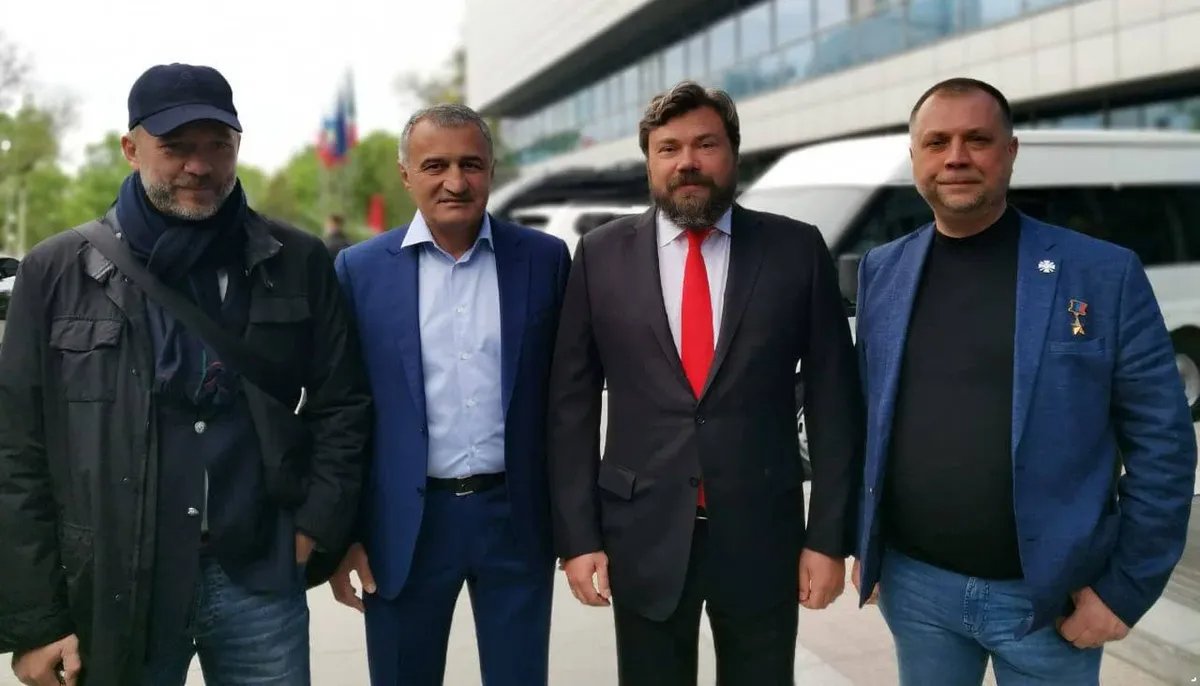
From left to right: Dmitry Sablin, Anatoly Babilov, Konstantin Malofeev, Alexander Borodai. Photo: Twitter
“I have often made my position on Ukraine clear, which could have given rise to rumours. I also recommended Aleksandr Borodai to Sergey Aksyonov (head of Crimea — editor’s note) for the position of DPR head. Borodai had been my advisor for a long time, and I considered him a brave and honourable man. Perhaps, this started the conspiracy theory that suggested I was managing something,” Malofeev told Vedomosti.
The media often brands Malofeev an Orthodox billionaire, although he does not agree with this designation. He said in an interview that the phrase “Orthodox billionaire” is funny to him, as it is an oxymoron. “It is written in the Gospel. The Saviour told a rich man who asked him what he must do to inherit eternal life: ‘Go, sell what you have, and give to the poor and you will have treasure in heaven; then come, follow me.’ So, a man can either be Orthodox or a billionaire,” he explained.
War and LGBT: the spiritual pillars
The position of Tsargrad TV can be characterised as conservative and monarchist. Tsargrad brands itself as “The First Russian” channel. The media outlet publishes news, interviews, and investigations. According to the channel itself, its area of expertise covers Russia, Armenia, Moldova, Kazakhstan and, notably, Kherson (Ukrainian city currently occupied by Russia — translator’s note). Like many online media outlets, the website is divided into various sections. One of them is dubbed “Ideology”.
“Tsargrad’s ideological department is a factory of Russian concepts. We do not uncover scandalous schemes, we are not ‘inventing the bicycle’, we’re not ‘discovering America’. We recover the lost concepts behind obvious things. Russia is a great Orthodox power with a thousand-year history. The Russian Church is the basis of our statehood and culture. Moscow is the Third Rome. A Russian person is the one who truly loves Russia, its history and culture. Family is a union between a man and a woman. And their children. Preferably many children. National conservation is the key objective of the state. An objective that cannot be fulfilled without a clear ideology,” the website’s team proclaims.
The majority of articles in the ideology section are dedicated to LGBT issues, which the authors see as the root of all evil in modern society that Russia must be protected from at all costs. As part of its noble fight, Tsargrad compiles “anti-ratings” of all kinds, such as: “Gay is not Slavic: top-10 Western pervert politicians”.
Tsargrad’s love of ratings does not limit itself to “sodomy”. In 2016, the media outlet published a “Top-100 Russophobes” that included “the most avid haters of Russia, according to experts and readers”. Later, the Russian Presidential Council for Civil Society and Human Rights, some of whose members made it to the Russophobe list, deemed the ranking “a provocation that involves the mechanism of inciting enmity and hatred”. However, the ranking was not deleted, and six years later, in 2022, Tsargrad published another “hit list”, this time including all public figures that condemned the Russian invasion of Ukraine.
Issues related to militarism and the global geopolitical situation are one of the key Tsargrad focus points.
Since the start of the year, even before the so-called “special operation”, one in two articles of the “first Russian” channel was dedicated to war, Donbas, or international relations.
Source: tsargrad.tv
Ctrl+C, Ctrl+V
Tsargrad’s slogan — “We are not afraid of telling the truth” — echoes Fox News’ “Real honest opinion”. Fox News is often referred to as the Western equivalent of Tsargrad. And not without reason, as both channels are famous for their radical right-wing views. Besides, Jack Hanick, a former Fox News producer, was part of the team that helped build Tsargrad from the ground up.
However, the similarity between Tsargrad and Fox News is overstated, media expert Vasily Gatov suggests. “Even the decidedly right-wing US media outlets, such as Fox News, make a clear differentiation between opinion and news. That is, if you watch Fox News on TV instead of watching compilations from Tucker Carlson’s show, you’ll find out that this madness is not present in the news,” the expert says. According to him, “the first Russian” channel is more akin to Breitbart, a US media outlet once ran by Steve Bannon, the man behind Donald Trump’s 2016 presidential campaign.
Breitbart, and then Tsargrad, represent what is considered by analysts the hyper partisan media. “The term hyper partisan media was coined at the same time as media outlets began operating first and foremost on social media. This term is used in the context of analysing people who refuse to consume a media product that goes against their views,” Gatov explains.
This habit of consuming media content mixed with news feed algorithms of such social media platforms as Facebook creates the so-called filter bubble, or in other words, an information bubble, for the reader, which only shows posts by like-minded people.
“Figuratively speaking, people with radical right-wing views end up in a ‘bubble’ of radical right-wing views, people with left-wing views only see left-wing takes and so on. As for the media outlets that end up slack in the middle of this consumption, they receive a false reaction and excess approval of extremely radical content. At the same time, the media receives disapproval, that is, fewer views and fewer reposts, when they publish conciliatory and universal content instead of politically partisan content,” the expert says.
Media outlets of this kind often use the formula of circular reference, which creates an illusion of reliable information for the reader. “This is a system which creates a link referencing a link, which references another link. In this flow of information, the sources that criticise an event or support it get mixed up. As a result, the consumer that wants to verify this information gets a false sense of being informed. At the same time, the reader gets the impression that this is a fact, this is news, not an opinion. The same technological tricks are present on Tsargrad,” Gatov concludes.
The faces of Tsargrad
The mastermind, the sponsor and the face of Tsargrad is Konstantin Malofeev. Here, we will talk about other personalities that helped create the “first Russian” channel or found fame because of it.
From 2016 until 2017, Aleksandr Dugin, Russian conservative esoteric philosopher and founder of the Eurasia Movement, served as Tsargrad chief editor. This Telegram post by Dugin helps explain why he was such a good fit for the TV channel:
“The territories of Donbass, Kherson, Zaporozhye, Nikolaev, Sloboda, Odessa and so on until Kiev, all of them are alive and real, they are full of Slavic presence, of Slavic being. Everything is rough, raw, and terrifying here, everything is enchanting here. When our soldiers and militia come here, they are filled with the spirit that is new to us, the spirit of the ancient Russian land. Our dash for Gostomel, Bucha, through Sumy and Chernigov, is a military adventure to the depths of our own selves. When we peel off the globalist Western layers of obsession from Ukraine, we find the sacred Malorussia. It reveals itself only to the Russian soldier, who will introduce his Ukrainian brother to it. But only when the special military operation ends. In Lvov. We are saving Ukraine from globalist nonsense, from the black spell of post-Modernism and total feeble-mindedness. We are saving the land. Our land.”
In 2017, Elena Sharoykina, born in Ukraine’s Dnipro, succeeded Dugin as editor-in-chief. She also heads Russia’s Nationwide Organisation for Genetic Safety and is involved in Donbas charities. In 2016, she was included on the list of Myrotvorets (a Ukrainian website that publishes an online dossier of thousands of pro-Moscow figures — translator’s note) as an “anti-Ukrainian propagandist”. In 2020, Darya Tokareva, the former head of news at Tsargrad, succeeded Sharoykina as chief editor.
Anna Shafran, reporter, writer, and former co-host of Russian propagandist Vladimir Solovyev, is also one of Tsargrad TV personalities. Shafran has her own show, in which she discusses global events with invited experts. The editorial line of the channel is clearly close to Shafran’s heart: back in 2018, she wrote a book dubbed “The state of honour. Monarchy is the future of Russia”.
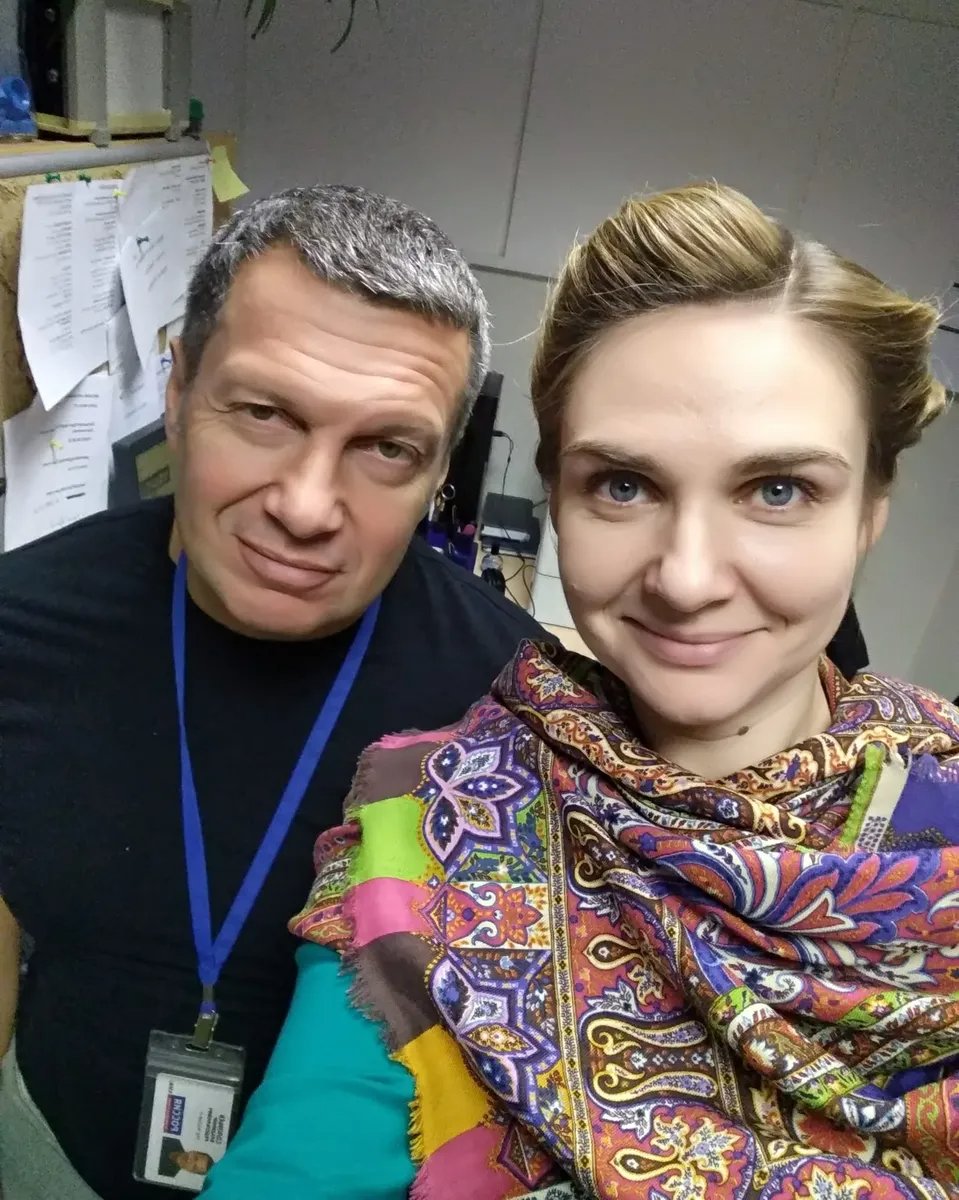
Vladimir Solovyev and Anna Shafran. Фото: Facebook
Archpriest Andrey Tkachev has his own daily show on Tsargrad called “The Holy Truth”, in which the clergyman discusses current events, including news related to feminism, abortion rights and the war. On Monday, Tkachev hosts another program dubbed “Father Andrey Answers”, in which he responds to the viewers’ questions. “WHO is out, better for Russia: the World Health Organisation is lobbying sodomy” and “Donbass is not fighting for Lenin: the liberated lands need Russian names” are some of the headlines for Tkachev’s daily shows.
Another popular author of the channel is Mikhail Tyurenkov. Tsargrad website says that Tyurenkov is the “chief editor, observer and head of the Tsargrad ideological department”. Tyurenkov’s op-eds are published on the “first Russian” website almost daily. He sometimes acts as a TV host. The team of Novaya Gazeta. Europe contacted Tyurenkov to find out what the channel’s ideology department is tasked with. Here is his unedited response. Perhaps, Mikhail’s response to our questions is sarcastic, but it is up to you to decide.
Currently, there are about 200 people employed at Tsargrad, a job ad for the position of HR manager placed on Russian recruitment service hh.ru says. According to former employee of Tsargrad Ekaterina, all these people share their employer’s views to a certain extent. “As for the people who do not share the ideology of the channel… I don’t know any people there that did not share it,” she recalls.
It is not hard to believe that, considering that the salaries at Tsargrad offered in archived job ads do not surpass the average for Moscow, and sometimes they are much lower. For example, a news reporter with over one year of work experience is offered a monthly salary starting with 50,000 rubles (€800), and a head of multimedia projects with six years of experience is offered a minimum of 60,000 rubles (€960).
A mouthpiece of Russian Orthodoxy
Tsargrad positions itself as an Orthodox channel, closely cooperating with religious organisations, including the Russian Orthodox Church. We spoke to religious expert Alexey Zygmont about how Tsargrad manages to combine Orthodox values and tough pro-war rhetoric.
“There is no contradiction between Orthodox values and supporting war, actually. From a global perspective, Orthodoxy has always been involved in that, ever since its integration with the state in the 4th century. From a narrower perspective, Tsargrad is an interesting phenomenon. It gives reputability and splendour to the specific version of Orthodox teachings that appeared at the turn of the 20th century. This is when the notion of a special eschatological role of Russia first appeared: Russia is basically on its own against the Antichrist and the global evil, it prevents the world from a collapse,” Zygmont explains.
“Now, the position of Tsargrad is not much different from the official policy of the Russian Orthodox Church. When he speaks about rejecting gay pride parades in Donbas or about the ‘righteous path’ and ‘heroic deeds’ of Russian soldiers, Patriarch Kirill makes it clear that war fits within the concept promoted by the Russian Orthodox Church.”
The militarisation of Russian Orthodoxy, which took place in the 2010s, representing a renaissance of imperial traditions, is part of the general rhetoric, the expert says.
Against this backdrop, the Main Cathedral of the Russian Armed Forces was built, where all the saints and all the resources of Orthodoxy and Christianity are put to the service of war, the state and the empire.
“There is Barbara, the patron saint of the missile forces, Prophet Elijah, the patron of the paratroopers, and as for Alexander Nevsky, he is a central figure in this mythology. There is an entire concept, all kinds of artefacts related to the integration of the church and war, including camouflage priest’s robes or inflatable church tents that are parachuted off planes. In other words, this is not a coincidence. The church has been preparing for it for a long time,” Zygmont says.
According to the expert, the Russian Orthodox Church supports the pillars of Tsargrad: both its pro-war sentiments and anti-Western rhetoric. “For example, back in 2000, when Putin was still playing nice with the West, Patriarch Alexy said that a well-planned bloodless war was being waged against Russia with the aim of destroying it. That is, aggressive anti-Western sentiments, a dualistic concept of the world that pits the Russian civilisation against the Western one — all this first appeared within the church and only later was it promoted by the state. Gradually, it turned into the dualistic concept of the world that is now promoted by Patriarch Kirill, the Russian Orthodox Church and the state. In this sense, Tsargrad TV and Malofeev in particular are ordinary and typical supporters of this concept, although they have their own features,” Zygmont points out.
Who watches Tsargrad and what is its purpose?
According to Medialogia, in June of this year, Tsargrad ranked seventh among the most cited outlets on social media. The channel’s website points out that “on average, in 2022, 2,068 users a minute are accessing the TV channel’s website” and that “one in five Russian residents read Tsargrad in April 2022”.
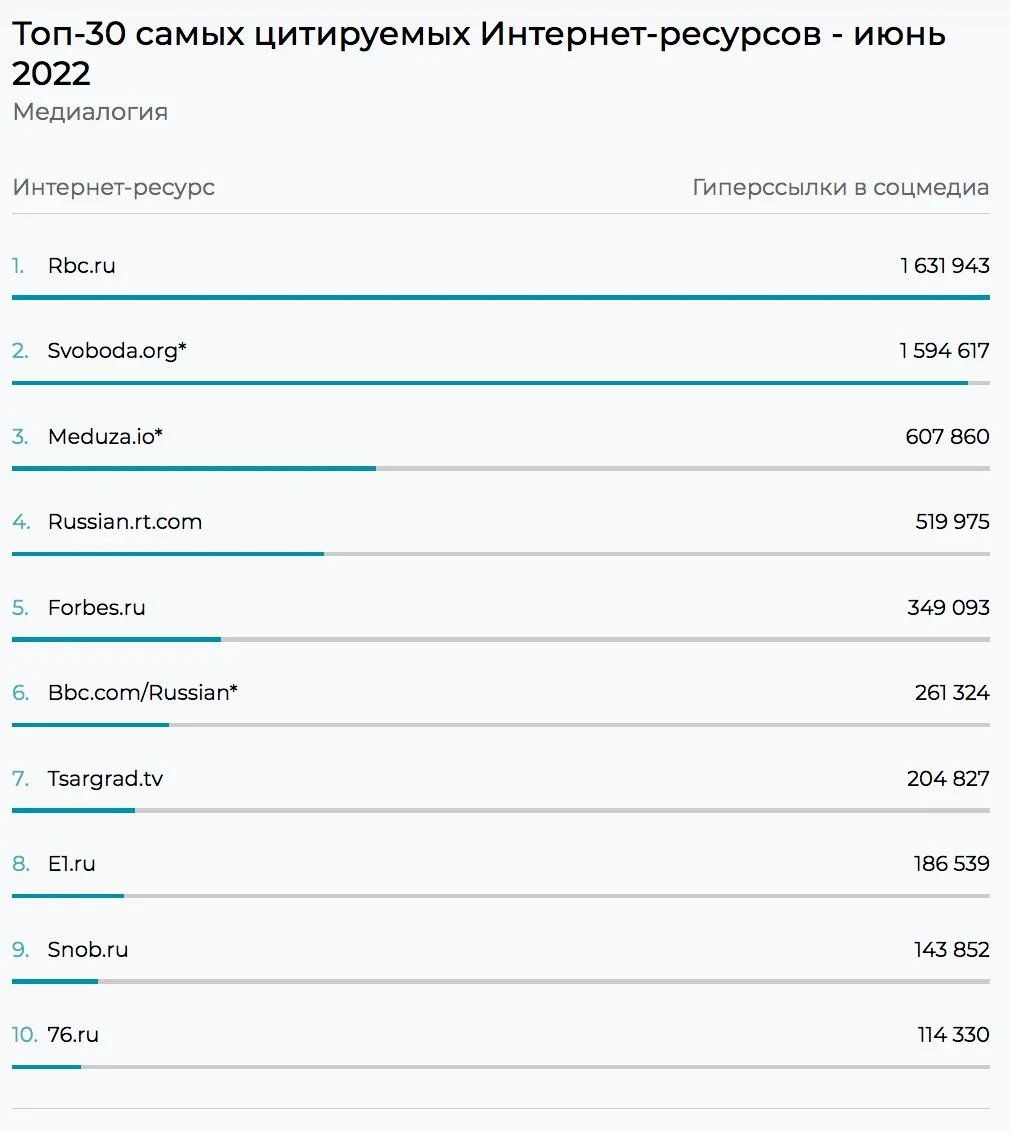
Top-30 of the most cited online media outlets, June 2022
Medialogia
Name of outlet
Number of hyperlinks on social media
Source: Medialogia
Despite the number of views, it is not clear whether Tsargrad TV manages to turn a profit. In 2019, after several years under sanctions, Malofeev told The Bell that Tsargrad was his only business venture. Besides the TV channel, the holding includes several companies and assets, including a hotel under the same name near Moscow. However, according to SPARK-Interfax, a system for verifying legal entities, Tsargrad Media, the parent company of the channel itself, is not profitable. The net loss of the “first Russian” channel has ranged from 394 mln rubles (€6.4 mln) to 73 mln rubles (€1.2 mln) over the past five years.
Nevertheless, Tsargrad Media does have some sources of revenue, including state contracts on the publication of articles promoting various Russian regions. For example, in 2022, Tsargrad Media signed at least three such contracts to the tune of 2.4 mln rubles (€38,800): two with the “department of information projects of the Novosibirsk region” and one with the government of the Chelyabinsk region. In accordance with these contracts, Tsargrad has to publish content on the activity of regional officials, as well as content “aimed to strengthen civil unity”. Novaya Gazeta (Moscow) previously wrote about similar deals struck with other Russian federal media outlets.
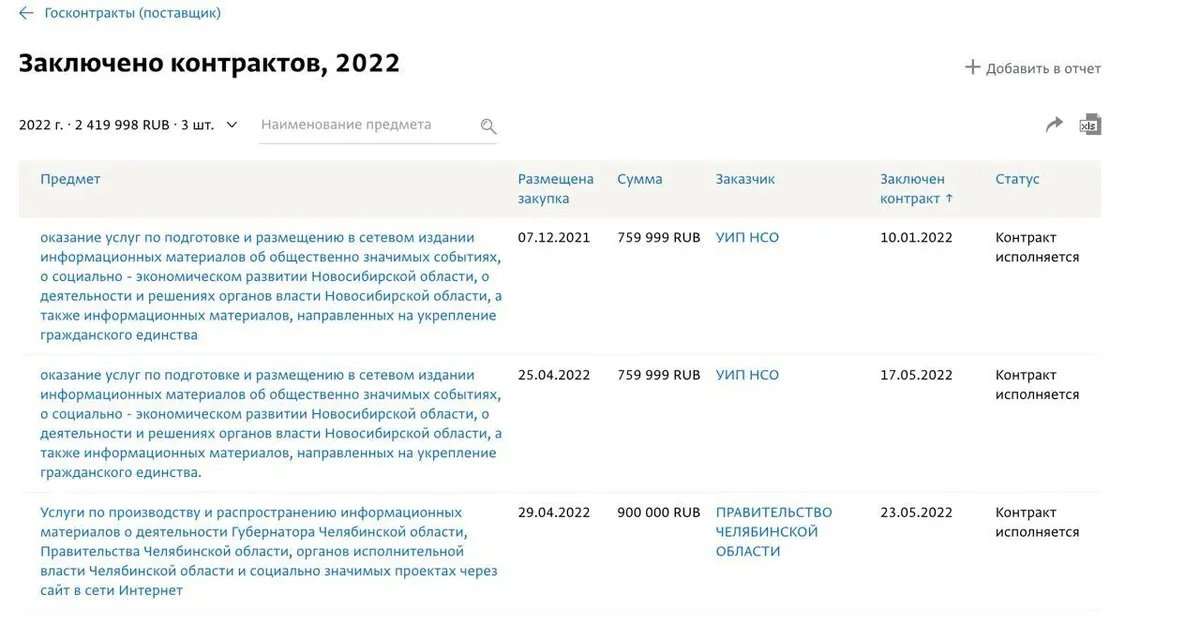
A screenshot from the SPARK-Interfax database showing three state contracts signed by Tsargrad on publishing “information on socially significant events and the social-economic development of the Novosibirsk region” as well as “information on the activity of the Chelyabinsk regional governor, the Chelyabinsk regional government and executive bodies, as well as socially significant projects”.
Due to the fact that the channel cannot be considered profitable, we can assume that this project is aimed to boost Malofeev’s public image and give him a stable foothold to enter Russian politics. As stated previously, his first political venture was unsuccessful, but he made another attempt shortly thereafter.
In 2017, Malofeev was made chairman of the Double-Headed Eagle Society, whose aim was to develop “Russian historic enlightenment” and “spread the knowledge of the history of the fatherland in the spirit of Russian traditions”. Three years later, in 2020, a new public movement was established on the basis of the Double-Headed Eagle Society, the Tsargrad Society.
“The number of supporters of Tsargrad ideology comes up to about a million people across the country. Over the past few months, we have received thousands of requests to unite our supporters under the aegis of one powerful organisation. And today, we have created this movement. Tsargrad is already the largest Russian organisation in the country,” Malоfeev said during the congress of the Double-Headed Eagle Society, where he announced that the organisation would now be named Tsargrad.
The manifest of the Tsargrad Society includes the organisation’s motto: “We are Russians. God is with us”. Its main goals are listed as follows: fighting Russophobia, recovering “historic justice”, and “resurrecting the Russian Empire within its historic borders”.
After the Tsargrad movement was founded, the organisation announced its plans to take part in the 2021 Russian State Duma elections as a “public observer”. “We will survey all candidates in 225 majoritarian districts and all candidates from political parties regarding their commitment to traditional family, religious and cultural values of the Russian people,” Malofeev’s press service stated.
According to political analysts interviewed by The Bell, the Double-Headed Eagle Society, and then possibly Tsargrad, were meant to become the foundation for establishing a new conservative party in Russia, but for various reasons, it did not happen.
It is unclear to what extent Tsargrad was involved in election observing, however, it seems that the organisation did not have any plans after the election. The latest publication on the society’s website is dated August 2021.
The threat from the right
According to media expert Gatov, the typical viewer of Tsargrad is an educated person with a higher-than-average income. “Most likely, there are two kinds of people [who watch it]: members of the law enforcement and those in their orbit who are getting paid, and medium-sized entrepreneurs from the regions who have always been very patriotic. They may not love Putin, but they have always loved Russia. I have several acquaintances, good regional businessmen who hate Putin, but they hate Putin from the right,” Gatov suggests.
“To the regime, the threat from the right exists at the same time as the threat from the left, so to say. They felt this threat, and this is why this resource [Tsargrad], ‘empty’ from a professional standpoint, was established, in order to, broadly speaking, distract people with right-wing and imperialist views with empty chatter on the Internet so that they wouldn’t set up combat units. Maybe now they would even like for them to set up these combat units, but it is unlikely to happen at this point,” Gatov concludes. At the very least, Tsargrad is unlikely to fulfil this objective.
This article was written with the help of the Novaya Gazeta Europe Data team and Victor Ivanov.
Join us in rebuilding Novaya Gazeta Europe
The Russian government has banned independent media. We were forced to leave our country in order to keep doing our job, telling our readers about what is going on Russia, Ukraine and Europe.
We will continue fighting against warfare and dictatorship. We believe that freedom of speech is the most efficient antidote against tyranny. Support us financially to help us fight for peace and freedom.
By clicking the Support button, you agree to the processing of your personal data.
To cancel a regular donation, please write to [email protected]
